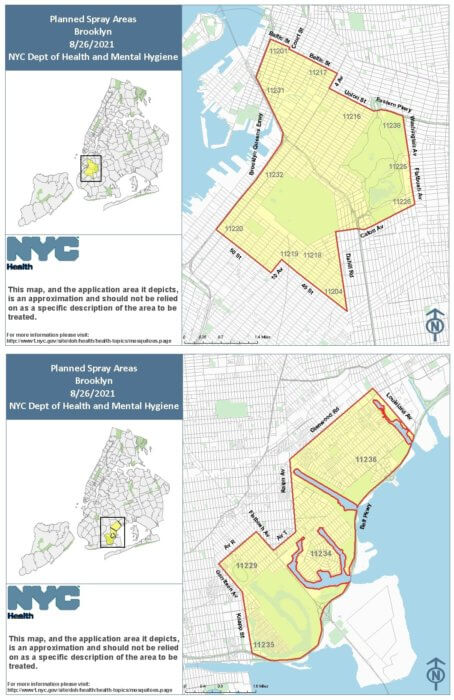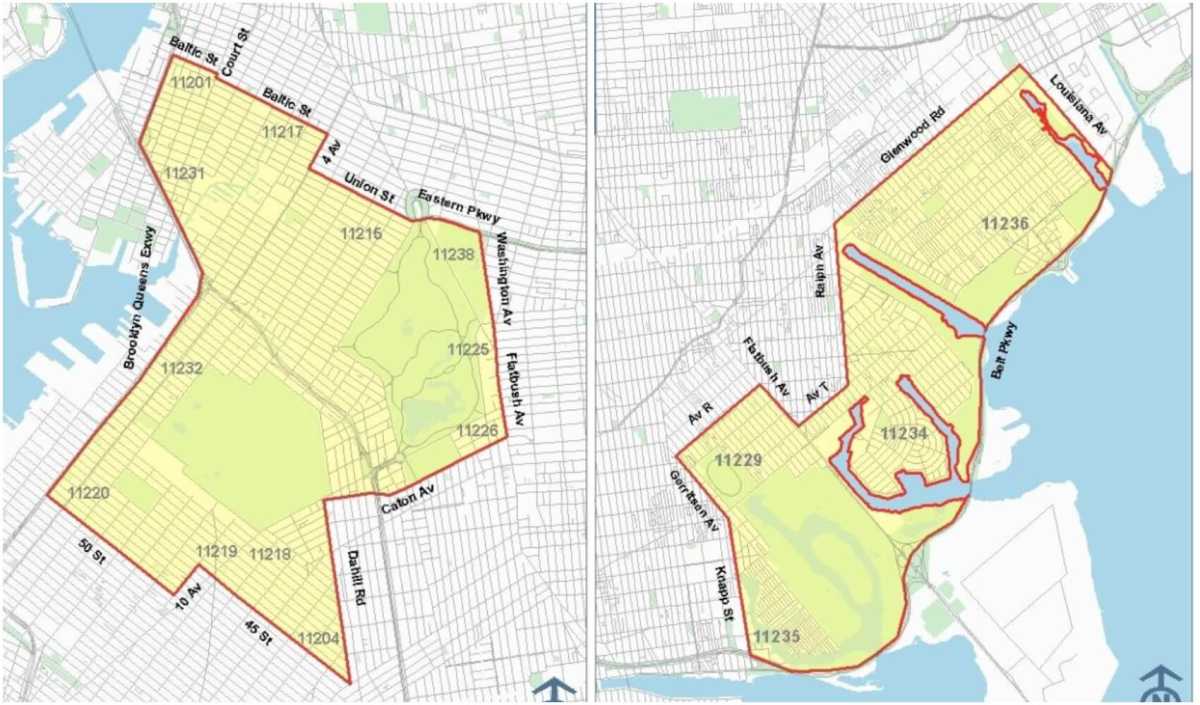A cadre of Health Department trucks will spray pesticides in across Brooklyn on Thursday night, as part of the city’s annual effort to combat mosquitoes and a disease they spread, the West Nile Virus.
The city will mount its offensive against the mosquito menace at 8:30 pm, according to a Heath Department advisory. Crews will work until 6 am Friday morning spraying streets with “very low concentrations,” about 2 grams per acre, of the adulticides Anvil, Duet, or DeltaGuard as a means of repelling or killing the insidious insects.
Streets, sidewalks, and the outside of private residences can be sprayed, a Health Department spokesperson said. The pesticides will be distributed using a truck-mounted spraying device, with a range of about 300 feet from the truck, with an “ultra-low volume spray” that kills insects on contact.
Pesticide application will be limited to areas where the city has identified mosquitoes carrying West Nile, the spokesperson said.
Central Brooklyn neighborhoods that will be hosed down include parts of Carroll Gardens, Cobble Hill, Gowanus, Greenwood Heights, Park Slope, Prospect Heights, Prospect Lefferts Gardens, Sunset Park, and Windsor Terrace, according to the Health Department. As for South Brooklyn, the city will spray parts of Bergen Beach, Canarsie, Georgetown, Gerritsen Beach, Marine Park, Mill Basin, Mill Island, Paerdegat Basin, Sheepshead Bay, and Starrett City. You can view a health department map of coverage areas below, or at this link.

The spray area includes several parks, including Prospect Park, Green-Wood Cemetery, Sunset Park, Marine Park, Paerdegat Basin Park, Canarsie Park, and the Fresh Creek Nature Preserve. The Health Department spokesperson said that all parks, golf courses, and cemeteries in the spray zone are eligible to be sprayed if West Nile-carrying mosquitoes have been identified there, despite the fact that the city banned the use of pesticides in parks earlier this year; the spokesperson said that the Health Department had obtained a waiver exempting it from the law in order to combat mosquitoes since the devious bugs pose a public health hazard.
The Health Department says that the health risks of exposure to those pesticides by humans and pets is minimal, though some people who are “sensitive to spray ingredients” may experience “short-term eye or throat irritation, or a rash.” Those with respiratory conditions may also be affected by the spray.
As such, the city is recommending that folks stay indoors during spraying. While the Health Department says residents can safely leave their air conditioners on, it may be wise to close air conditioner vents.
If you are exposed to pesticides during spraying, however, the Health Department recommends washing with soap and water any skin or clothing that may have been exposed. Furniture, toys, or anything else left outside during a spray should be washed, the Department spokesperson said. And if you have fruit or vegetable-bearing plants outdoors that are exposed, remember to wash them before consuming them.
West Nile Virus should be taken seriously, the Health Department says, as it can be deadly for those who contract it. Most people who get it have no symptoms, while others develop comparatively mild symptoms such as fever, headache, body aches, joint pains, vomiting, diarrhea, or rash, and recover completely but may experience fatigue for weeks or months, according to the Centers for Disease Control and Prevention.
About 1 in 150 people who contract West Nile, however, develop severe illness affecting the central nervous system, including encephalitis (brain inflammation) or meningitis (inflammation of protective membranes around the brain or spinal cord), according to the CDC. Symptoms include high fever, headache, neck stiffness, stupor, disorientation, coma, tremors, convulsions, muscle weakness, vision loss, numbness and paralysis, the CDC says.
About 1 in 10 people who develop severe illness from West Nile die, while those who survive face a potentially months-long recovery and permanent nervous system damage. Older and immunocompromised people are at increased risk of severe illness.
The Health Department announced in July that mosquitoes infected with West Nile had been discovered in all five boroughs. 830 mosquito “pools” have tested positive for West Nile this year, per department data, nearly double the number of positives tested last year. 97 of those positives have been in Brooklyn. Meanwhile, three people in the city (two in the Bronx and one in Queens) have tested positive for West Nile Neuroinvasive Disease, which can include encephalitis, meningitis, or acute flaccid paralysis — severe muscle weakness associated with West Nile.
To reduce exposure to mosquitoes, the city advises residents to eliminate any standing water from their property and to toss containers that may contain standing water, which is a violation of the city’s health code. Eliminating standing water, where mosquitoes often congregate, is the best mitigation method, the Department says.
It also recommends using certain insect repellents (containing the ingredients picaridin, DEET, oil of lemon eucalyptus (though not recommended for children under 3), or those products that contain the active ingredient IR3535, per department guidance), making sure windows have screens, cleaning out gutters, and cleaning and chlorinating swimming pools.
























